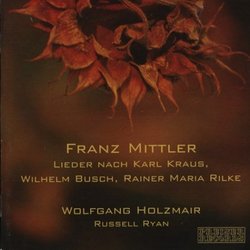| All Artists: Franz Mittler, Diana Mittler, Russell Ryan, Wolfgang Holzmair Title: Franz Mittler: Lieder nach Karl Kraus, Wilhelm Busch, Rainer Maria Rilke Members Wishing: 1 Total Copies: 0 Label: Preiser Records Release Date: 8/31/2004 Genres: Pop, Classical Styles: Vocal Pop, Opera & Classical Vocal, Chamber Music, Historical Periods, Modern, 20th, & 21st Century Number of Discs: 1 SwapaCD Credits: 1 UPC: 717281905671 |
Search - Franz Mittler, Diana Mittler, Russell Ryan :: Franz Mittler: Lieder nach Karl Kraus, Wilhelm Busch, Rainer Maria Rilke
 | Franz Mittler, Diana Mittler, Russell Ryan Franz Mittler: Lieder nach Karl Kraus, Wilhelm Busch, Rainer Maria Rilke Genres: Pop, Classical While much attention has recently been paid to composers who lost their lives in the Holocaust, those who survived but lost their careers have gone virtually unnoticed. One of these was Franz Mittler (1893-1970), highly re... more » |
Larger Image |
CD Details
Synopsis
Amazon.com
While much attention has recently been paid to composers who lost their lives in the Holocaust, those who survived but lost their careers have gone virtually unnoticed. One of these was Franz Mittler (1893-1970), highly regarded in his native Austria as the composer of over 200 works, primarily songs. In America, where he emigrated in 1938, he became known mainly for his arrangements and pleasant teaching materials, and for his collaboration with three other European musicians in the First Piano Quartet. In Vienna, he was considered one of the foremost vocal accompanists and chamber music player; his most unusual partner was the poet, writer, critic and monologist Karl Kraus, many of whose poems he set to music. Kraus was famous for his solo readings of Nestroy's comedies and Offenbach's operettas, but since he could neither sing nor read notes, Mittler, hidden behind a screen, provided the music. This record includes two instrumental works in addition to the songs. Of the Piano Pieces (1926), the first is somewhat Schumannesque, the second humorous, and the third is a brilliant imitation of a child's mechanical clock, complete with winding up and running down. The piano writing is splendid, as is the performance by Mittler's daughter Diana. The Piano Trio (1912) frankly acknowledges all the influences that formed the 19-year-old composer; romantically expressive, it is written straight from the heart. Mittler's many-faceted stylistic originality shows most clearly in his songs, especially in his ability to capture and underline the poetry's contrasting character, mood and texture, from tender, morose, ironic, to Viennese "pop", with lyrical and jagged vocal lines and surprisingly dissonant and impressionist harmonies. This record should help re-discover an unjustly neglected composer, abetted by the persuasive advocacy of Holzmair and Ryan; their wonderfully idiomatic performance brings out every verbal and musical nuance, from the trenchant Kraus settings to Rilke's hauntingly beautiful, simple "Folksong." --Edith Eisler
